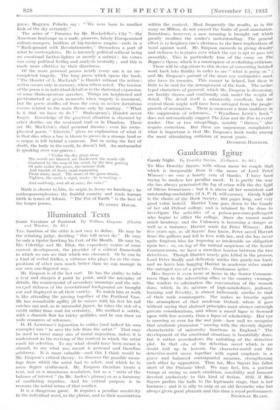Gaudeamus Igitur
Gaudy Night. By Dorothy Sayers. (Gollancz. 8s. Gd.) To Miss Dorothy Sayers, with whose name we -couple thati, which is inseparable from it—the name of Lord Peter Wimsey—we owe a hearty vote of thanks, I have been trying to analyse her peculiar merit. It is partly the way she has always penetrated the fog of crime with the dry light of Iitkrae humaniores : but it is above all her consistent and outstanding readability (if A. P. II. will excuse). Gaudy Night is the choice of the Book Society, 483 pages long, and very good value indeed. Harriet Vane goes down to the Gaudy of her old Oxford college, and is retained by the dons to investigate the activities of a poison-pen-cum-poltergeist who begins to afflict the college. Since she cannot make much headway, and the Unknown is becoming a danger as well as a nuisance, Harriet semis for Peter Wimsey. But five years ago, as all Sayers' fans know, Peter saved Harriet from the gallows and fell in love with her, and she has never quite forgiven him for imposing so intolerable an obligation upon her : so, on top of the mutual suspicions of the Senior Common-room, we have a merciless tension between the two detectives. Though Harriet nearly gets killed in the process, Lord Peter finally and delicately unties this gaudy-ian knot, and we leave him hugging Harriet in academic robes under the outraged eye of a proctor. Gaudeamus igitur.
Miss Sayers is even more at home in the Senior Common- room than in the advertising office or the country vicarage. She renders to -admiration the conversation of the women dons, which, in its mixture of high-mindedness, jealousy, learning and frivolity, is almost ludicrously similar to that of their male counterparts. She makes us breathe again the atmosphere of that academic Oxford, where it goes without saying that abstract principles must always outweigh private considerations, and where a moral lapse is frowned upon with less severity than a lapse of scholarship. Her eye is unerring as ever for the mot juste—how well we recognise that academic procession " Moving With the slovenly dignity characteristic of university functions in England." The development of the emotional situations is beautifully done, but it rather overshadows the unfolding of the detective plot. In that Eloos of the detection novel which is no doubt laid up in heaven, the character-motif and the detective-motif move together with equal emphasis in a grave and balanced contrapuntal measure, strengthening each other by opposition. Thus far, Miss Sayers has fallen short of the Platonic ideal. We may feel, too, a puritan twinge at seeing so much erudition, sensibility and humour- devoted exclusively to this kind of fiction. Still, if Miss Sayers prefers the halls to the legitimate stage, that is her business : and it- is silly to carp at an old favourite who has always given great pleasure and this time a royal performance.
NICHOLAS BLAKE.










































 Previous page
Previous page